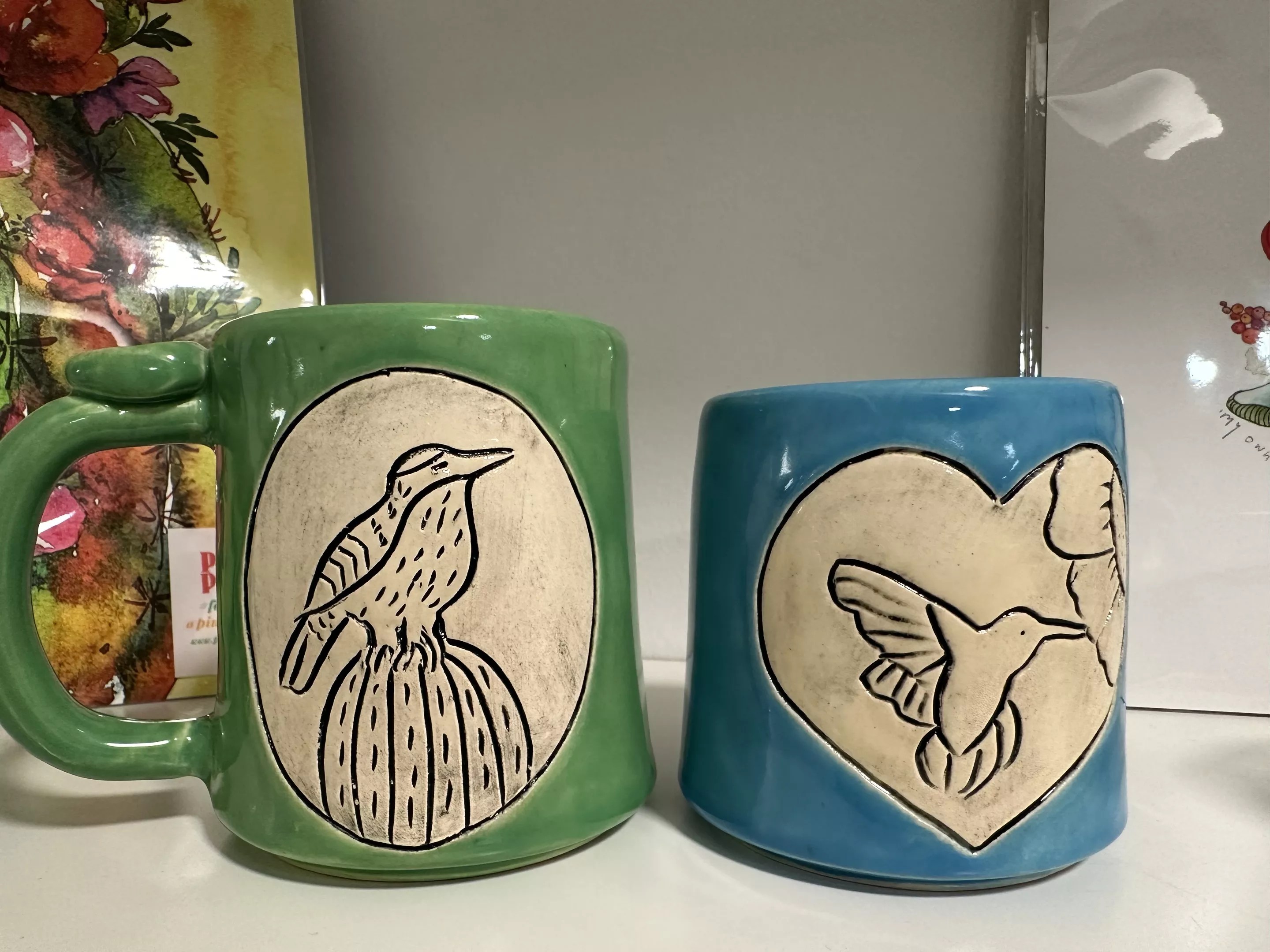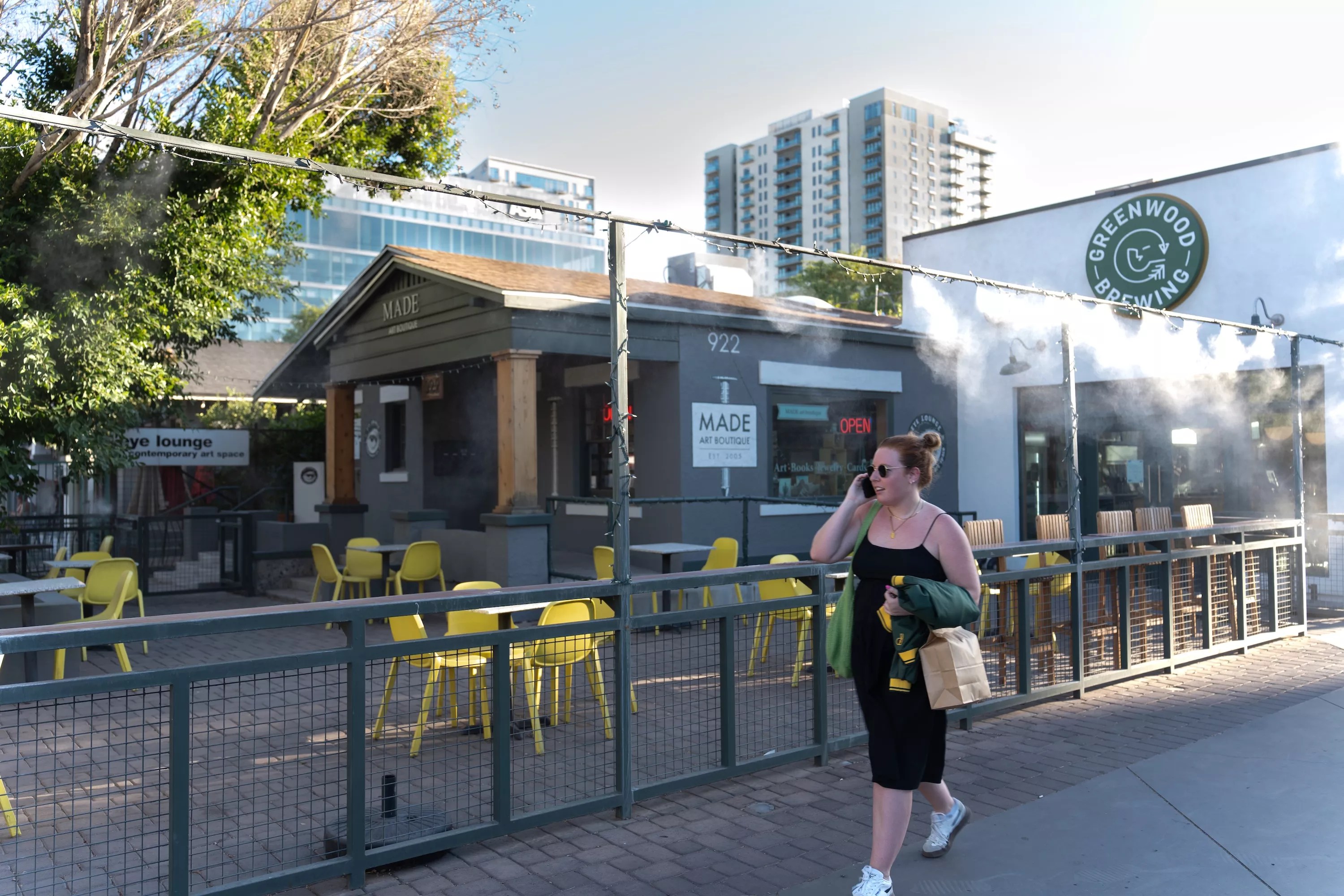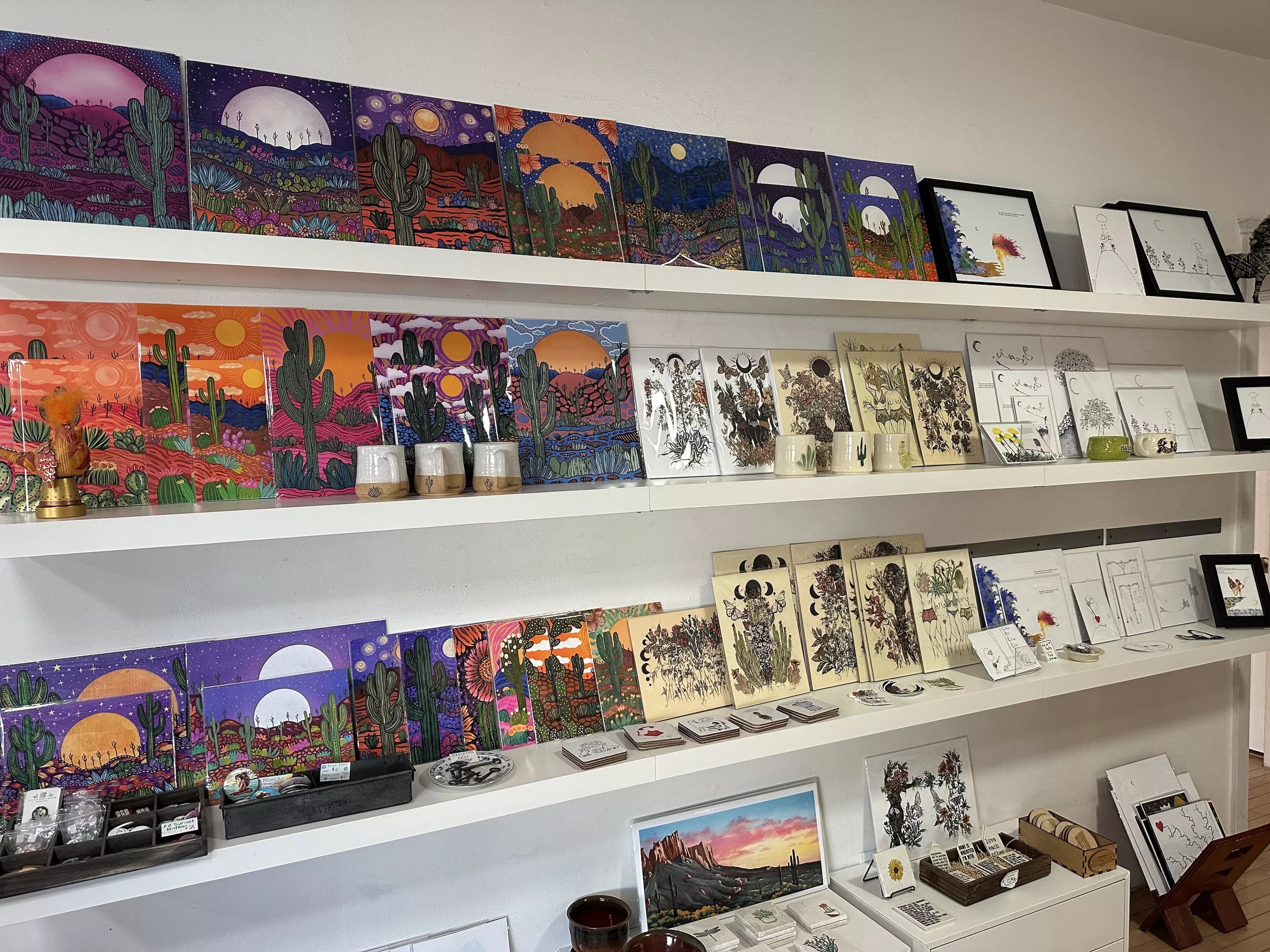
MADE Art Boutique

Audio By Carbonatix
A year after Cindy Dach and Greg Esser bought the 1920 bungalow on the corner of Roosevelt and Fifth streets in downtown Phoenix a quarter of a century ago, they planted three ficus trees on the property.
They weren’t even as tall as the petite Dach at the time. Now, two of those trees tower over the courtyard, the branches shading the entire corner in front of their retail gallery, MADE Art Boutique, which celebrated its 20th anniversary last month.
The tree is an apt metaphor for the growth of Roosevelt Row Arts District and Downtown Phoenix, which the couple has helped nurture over the decades.
MADE Art Boutique is more than the sum of its parts. The 500-square-foot shop sells small, handcrafted works by local artists and makers such as stickers, T-shirts, ceramics, jewelry, soaps, keychains, Dach’s embroidery, and Esser’s linoleum print and handmade cut greeting cards.
But MADE’s casual shoppers might not realize it’s also become a hub for the artistic community and one of the springboards for the rebirth of downtown.

Cindy Dach and Greg Esser opened MADE Art Boutique in 2005 and have worked to preserve and evolve Roosevelt Row.
Geri Koeppel
“Greg and Cindy have been founders of Roosevelt Row and what it’s become,” says Megan Greenwood, owner of Greenwood Brewing, which is adjacent to MADE and shares the patio space. “They’re inspiring to all the businesses on this street, especially Greenwood. Seeing what they started and what it’s become, they were a huge part of that.”
She continues, “Greg and Cindy have worked really hard to help bring this vision of downtown Phoenix to life. … In my eyes, that’s what made it work – that they had a vision. They believed in downtown. They knew what it could be, and they worked really hard to get it here.”

Cindy Dach and Greg Esser planted three ficus trees on their property on Roosevelt and Fifth streets in 2001, two of which are still there today.
Greg Esser
Small space, big impact
MADE Art Boutique sprouted out of First Fridays, which technically began as Second Wednesdays in 1992 and switched when Artlink began promoting it in 1994.
By the early 2000s, hundreds of people swarmed the streets on First Fridays, roaming from gallery to gallery, drinking boxed wine, and gazing at local artwork – usually large-format paintings.
Meanwhile, Esser and other artists had started a collective called Eye Lounge that held monthly exhibitions. The individual artists would have a show annually but didn’t have a place to sell regularly.
Dach says, “At that time, there weren’t a lot of spaces in Arizona where you could buy a small, handcrafted item by an artist.”
Dach and Esser bought the bungalow in 2000 and turned half of it into the Eye Lounge Contemporary Gallery. The other half was a live/work space for artists. In 2005, the couple converted 200 square feet into MADE Art Boutique, which opened on the first Friday of March in 2005.
At first, the couple drew upon their connections in the art community, and Dach would go to pop-up artists’ markets to find works. As word got out, artists pitched their wares to Dach.
“At the beginning, I couldn’t say no to anyone, so I pretty much said ‘yes’ to everyone,” Dach recalls. “It was a very cluttered shop.”
Over time, she learned to respond to customers and only accept well-made, unique items at an approachable price point.
However, a lot of what she chooses boils down to “a feeling,” Dach says.

Mugs from Crooked Tree Ceramics by Colleen Conlin exemplify the maker mentality at MADE Art Boutique.
Geri Koeppel
Dach estimates MADE has carried goods from about 200 creators over the two decades. One of them is Colleen Conlin of Tucson, owner of Crooked Tree Ceramics, who says selling her work at MADE “jump-started things for me.”
She’d been selling at art shows and online, but after MADE accepted her pottery, it gave her recognition, and other shops started carrying her lines, too.
Conlin adds that MADE also helped her connect to the Roosevelt Row art community and allowed her to concentrate on making rather than marketing.
“To have someone else sell it for me is wonderful, and I get to be creating in my studio,” she says.
In addition, the staff at MADE are ambassadors, eager to share artists’ stories with customers and give feedback to the artists about what’s selling and what buyers are saying.
“They are really connected with their artists,” Conlin says. “I’ve been with other shops where you drop it off, and that’s it.”

MADE Art Boutique shown in in 2017, before the beer garden/patio shared with Greenwood Brewing was built.
MADE Art Boutique
Fostering community through art
In addition to supporting artists, MADE fostered a sense of community as more neighbors moved into Roosevelt Row. Though some lamented that condos and midrise apartments were gentrifying the area in the mid-2000s, many of those residents have been loyal customers.
Amy Sitver, who moved to Roosevelt Row about the same time as MADE opened, says she shops there frequently. She buys soaps, candles, Dach’s embroidery, Esser’s cards, stickers for her water bottle, pens and more.
She has purchased several jewelry items, saying, “It’s a piece of art that’s affordable that I can wear or give as a gift.”
Sitver also fondly recalled Dach, co-owner and CEO of Changing Hands Bookstore, starting a book club out of MADEthat brought neighbors together. She also gives Dach and Esser credit for keeping the neighborhood from becoming cookie-cutter.
“They’re just sweet people that really want to keep the arts alive and independent businesses alive and give artists a try,” she says, “which is really important down here. I don’t want it to become all chains. It’s nice to have that independent vibe.”
Early on, Esser says, they and other businesses in the area realized collaboration, cross-promotion and being open similar and regular hours were essential. The Roosevelt Row business group printed a directory placed at MADE and elsewhere that listed services and retail beyond arts-related businesses.
Dach says that set the stage for further development.
“At that time you could … go around and speak in person with every business owner in the neighborhood because there were literally so few that were open at that time,” she says. “Today, it’s hard to keep track of the number of new businesses. They are opening almost on a weekly, monthly basis in the neighborhood.”
Kimber Lanning, founder and CEO of Local First Arizona, agrees that Dach and Esser have been integral in fostering the neighborhood and its indie shops.
“At its core, (MADE is) a community development space that leverages arts as a mechanism around which the community gathers,” she states.
Lanning also credits MADE for punching above its weight in economic impact.
“From a local business perspective, they support … hundreds of microbusinesses, solopreneurs, artists, through MADE,” she says. “Yes, it’s one store, but supporting hundreds of other businesses and families.”

Flanked by Eye Lounge Contemporary Gallery and Greenwood Brewing, MADE Art Boutique is a cornerstone of Roosevelt Row.
MADE Art Boutique
Advocating for Roosevelt Row
Staying open for 20 years and helping artists and other businesses along the way is no small feat. But Dach and Esser have done even more than that. They’re champions of revitalizing Roosevelt Row and downtown Phoenix.
Even though First Fridays were often raging in the late 1990s and early 2000s, “foot traffic” the rest of the time was mostly an oxymoron. The neighborhood was dotted with early 20th-century homes and unassuming storefronts punctuated by vacant lots that a visiting architect once called “many missing teeth,” Dach notes.
When MADE opened in 2005, Arizona State University’s downtown campus, light rail and the spurt of multistory apartment buildings were still a few years away. Dach and Esser worked to ensure those things blended into the city’s fabric rather than tearing it asunder.
They knew they wouldn’t get kicked out because they own their building, but they advocated for a grand plan that wouldn’t raze everything that made Roosevelt Row special.
“One thing that people don’t understand is that districts in downtowns don’t just happen by happenstance,” Lanning explains. “It takes a lot of behind-the-scenes work.”
Esser says that meant attending meetings to develop the kind of community they wanted to be a part of, “and doing it day in and day out for decades.” Dach says they’ve always lived by the mantra, “What if?”
They worked tirelessly with Phoenix’s streets and arts and culture departments on design and planning. They helped create an Arts, Culture and Small Business Overlay to encourage adaptive reuse.

MADE Art Boutique has always been a place for local artists to sell small, handcrafted items.
Geri Koeppel
One of the core values of Roosevelt Row advocates was building a walkable community, Esser says.
With many others in the community, the couple fought to narrow Roosevelt Street from seven lanes of traffic and widen sidewalks from a miserly four feet. Dach and Esser also helped secure federal grants for streetscape improvements.
“Working more than a decade on the design of widening the sidewalks around Roosevelt Street to allow outdoor sidewalk dining was a major milestone,” Esser says.
However, it wasn’t without growing pains.
“Roosevelt Street went through so much construction, Fifth Street went through so much construction, that over the 20 years there were days and weeks that you couldn’t even get to us because the neighborhood was constantly under construction,” Dach says. “At the beginning, there were zero-dollar days.”
She adds, “From my accountant’s perspective, she did not know why we were doing what we were doing.”
Sitver says the area has progressed “well beyond what we thought would happen,” and notes, “I’m really glad they’ve stayed in business this long.”

Balloons marked the 20th anniversary of MADE Art Boutique the first weekend of March.
Geri Koeppel
Working with the next generation
Today, Roosevelt Row is a jewel of the city, but Dach and Esser hope the next generation will build on what they’ve created. Esser says more opportunities exist to “cultivate the role and presence of artists in the neighborhood.”
“Before MADE opened in that historic residential structure, we had it as a live-work space,” he says. “That was something we had hoped would develop. It has not, for a variety of reasons.”
However, the area has grown in other respects. Lanning points out it’s on its way to becoming a craft brewing district, with Greenwood Brewing, Arizona Wilderness Brewing and Pedal Haus Brewery already within a couple of blocks of each other and more on the way. Various tap rooms are also within walking distance of them.
Dach and Esser are excited about owner Megan Greenwood’s role in continuing and shaping Roosevelt Row’s legacy while remaining committed to its roots.
Dach says, “Not only does she show art at Greenwood, but all of her beer can designs are done by local artists.”
Greenwood says that when she was looking to open her brewery, Dach and Esser were “completely open” to her ideas.
“They said, ‘Tell us what you envision,'” she says, “and I thought was the best way to start a great partnership.”
So what’s next for Dach, who is still intimately involved in running Changing Hands, and Esser, who went to law school in his 50s and is now an attorney?
They’re still active in the community but happy to work with the next generation – people like Greenwood – to build on their groundwork and to keep watering the trees, so to speak.
Esser says community building “is time-consuming. It is physically and emotionally draining and exhausting, and there is a limit to how much I think any one person can do.”
Dach muses that Roosevelt Row has “always been an attracter of people who want to evolve and protect it. That’s what I love about our area.”
She adds, “We are now watching people in their 30s and 20s coming in and doing activations, and that is so great to see because it doesn’t end with us. It evolves.”